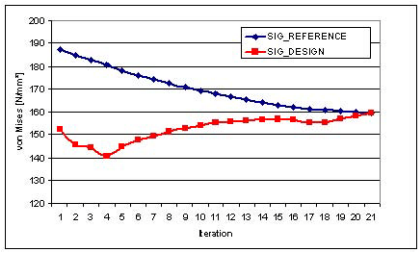-
Define a numerical variable (VARIABLE) that contains the maximum stress value
of the nodes in the primary notch:
VARIABLE
ID_NAME = REF_NODE_STRESS
DEF_TYPE = SYSTEM
UPDATE = EVER
TYPE = SIG_MISES
ND_GROUP = REFERENCE_NODES
GROUP_OPER = MAX
END_
The variable stress value is updated in each iteration.
-
Define a Design Response (DRESP) with the maximum von Mises Stress in the design area:
DRESP
ID_NAME = DRESP_VON_MISES
DEF_TYPE = SYSTEM
TYPE = SIG_MISES
ND_GROUP = design_nodes
GROUP_OPER = Max
END_
-
Reference the Design Response and Variable in the Objective Function (OBJ_FUNC):
OBJ_FUNC
ID_NAME = minimize_deviation
DRESP = DRESP_VON_MISES, ,REF_NODE_STRESS
TARGET = MINMAX
END_
The objective function of the optimization problem is to minimize the deviation
of the stress values in the design area from the variable reference values.
That means the maximum stress value in the design area (secondary notch) is closer to the stress level found in the reference area (primary notch)
where the stress level in the primary notch is lowered.
The result looks as follows:

The stresses at the reference nodes in the design area are drastically minimized
through the optimized relief notch:


